第一单元 写作精编版
- 格式:pptx
- 大小:169.68 KB
- 文档页数:18
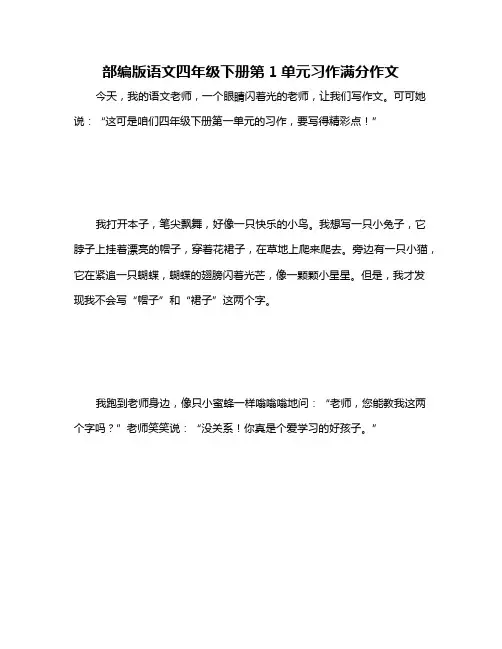
部编版语文四年级下册第1单元习作满分作文
今天,我的语文老师,一个眼睛闪着光的老师,让我们写作文。
可可她说:“这可是咱们四年级下册第一单元的习作,要写得精彩点!”
我打开本子,笔尖飘舞,好像一只快乐的小鸟。
我想写一只小兔子,它脖子上挂着漂亮的帽子,穿着花裙子,在草地上爬来爬去。
旁边有一只小猫,它在紧追一只蝴蝶,蝴蝶的翅膀闪着光芒,像一颗颗小星星。
但是,我才发现我不会写“帽子”和“裙子”这两个字。
我跑到老师身边,像只小蜜蜂一样嗡嗡嗡地问:“老师,您能教我这两个字吗?”老师笑笑说:“没关系!你真是个爱学习的好孩子。
”
我学会了这两个字,开心地离开了座位,继续写我的小兔子和小猫。
我写了小兔子跳到小猫身上,小猫吓得汪汪叫起来。
小兔子大笑起来,小猫也跟着一起笑了。
我写了蝴蝶停在小兔子头上,小兔子闭上双眼,像在做梦。
我写完几个大字,心里美滋滋的,好像自己也变成了那只很开心的兔子,在草地上蹦蹦哒哒。
老师说我的作文写得挺好的,还把它贴在了教室的墙上,让全班同学欣赏。
我不仅觉得开心,而且我的作文就像一朵动人的花,刚刚在我的心里开放。
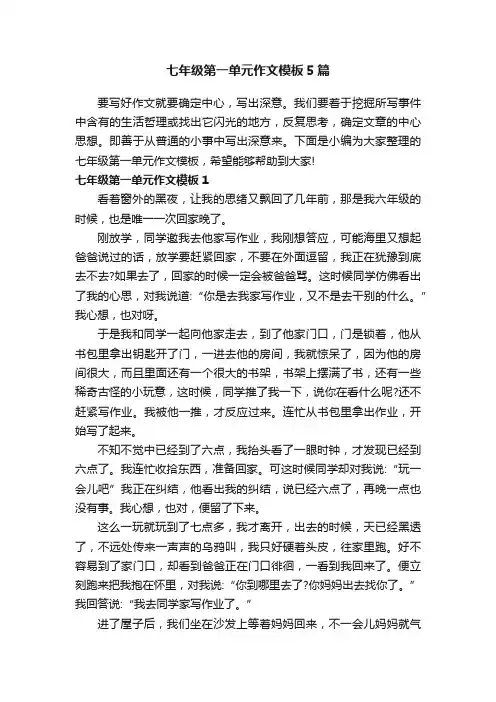
七年级第一单元作文模板5篇要写好作文就要确定中心,写出深意。
我们要着于挖掘所写事件中含有的生活哲理或找出它闪光的地方,反复思考,确定文章的中心思想。
即善于从普通的小事中写出深意来。
下面是小编为大家整理的七年级第一单元作文模板,希望能够帮助到大家!七年级第一单元作文模板1看着窗外的黑夜,让我的思绪又飘回了几年前,那是我六年级的时候,也是唯一一次回家晚了。
刚放学,同学邀我去他家写作业,我刚想答应,可能海里又想起爸爸说过的话,放学要赶紧回家,不要在外面逗留,我正在犹豫到底去不去?如果去了,回家的时候一定会被爸爸骂。
这时候同学仿佛看出了我的心思,对我说道:“你是去我家写作业,又不是去干别的什么。
”我心想,也对呀。
于是我和同学一起向他家走去,到了他家门口,门是锁着,他从书包里拿出钥匙开了门,一进去他的房间,我就惊呆了,因为他的房间很大,而且里面还有一个很大的书架,书架上摆满了书,还有一些稀奇古怪的小玩意,这时候,同学推了我一下,说你在看什么呢?还不赶紧写作业。
我被他一推,才反应过来。
连忙从书包里拿出作业,开始写了起来。
不知不觉中已经到了六点,我抬头看了一眼时钟,才发现已经到六点了。
我连忙收拾东西,准备回家。
可这时候同学却对我说:“玩一会儿吧”我正在纠结,他看出我的纠结,说已经六点了,再晚一点也没有事。
我心想,也对,便留了下来。
这么一玩就玩到了七点多,我才离开,出去的时候,天已经黑透了,不远处传来一声声的乌鸦叫,我只好硬着头皮,往家里跑。
好不容易到了家门口,却看到爸爸正在门口徘徊,一看到我回来了。
便立刻跑来把我抱在怀里,对我说:“你到哪里去了?你妈妈出去找你了。
”我回答说:“我去同学家写作业了。
”进了屋子后,我们坐在沙发上等着妈妈回来,不一会儿妈妈就气喘吁吁的回来了,一看到我,便说:“你这孩子,去同学家写作业,也不告诉我们一声,还害得我们到处找你。
”我看着妈妈,对妈妈说了一声:“妈妈,对不起。
”妈妈把我紧紧抱在怀里。
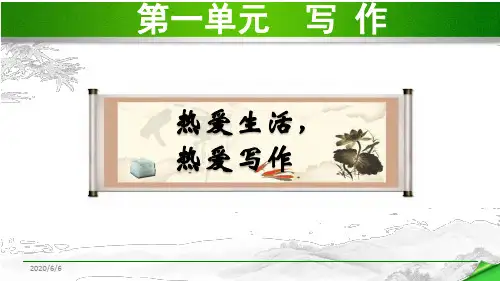
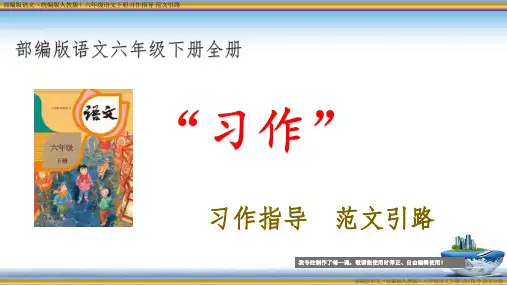
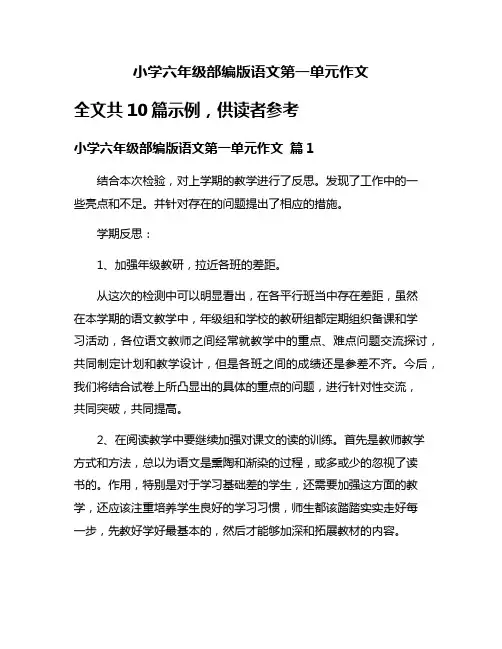
小学六年级部编版语文第一单元作文全文共10篇示例,供读者参考小学六年级部编版语文第一单元作文篇1结合本次检验,对上学期的教学进行了反思。
发现了工作中的一些亮点和不足。
并针对存在的问题提出了相应的措施。
学期反思:1、加强年级教研,拉近各班的差距。
从这次的检测中可以明显看出,在各平行班当中存在差距,虽然在本学期的语文教学中,年级组和学校的教研组都定期组织备课和学习活动,各位语文教师之间经常就教学中的重点、难点问题交流探讨,共同制定计划和教学设计,但是各班之间的成绩还是参差不齐。
今后,我们将结合试卷上所凸显出的具体的重点的问题,进行针对性交流,共同突破,共同提高。
2、在阅读教学中要继续加强对课文的读的训练。
首先是教师教学方式和方法,总以为语文是熏陶和渐染的过程,或多或少的忽视了读书的。
作用,特别是对于学习基础差的学生,还需要加强这方面的教学,还应该注重培养学生良好的学习习惯,师生都该踏踏实实走好每一步,先教好学好最基本的,然后才能够加深和拓展教材的内容。
3、是学生的学习态度和策略。
本此考试类型仍然是积累,阅读,写作三大块,本次失分较多的是阅读。
阅读题着眼于检测学生阅读方法与态度及知识面的能力,虽然平时已经注重给学生们在这一方面的练习与指导,但是练习得不够扎实。
从学生那里了解到:有的是因为没有接触过的题目不会做,有的是粗心、不仔细,理解错题目意思。
要改变这种状况,关键是让学生掌握阅读方法及技巧。
4、通过这次考试,在今后的教学中要注意重视学生的学习态度的培养,着眼于学习策略教学。
继续加强课堂教学改革的研究,不断反思和改进课堂教学,采取多种形式进行教学,在实践中不断研究如何培养学生阅读兴趣,提高其阅读能力和写作水平;在练习中培养学生审题能力和答题方法,同时也培养学生仔细答题的好习惯。
对于学习有困难的学生,学习能力有待开发的学生,要多单独辅导,与家长密切联系,三方共同努力。
教学改进措施:1、充分发挥学生的自主性。

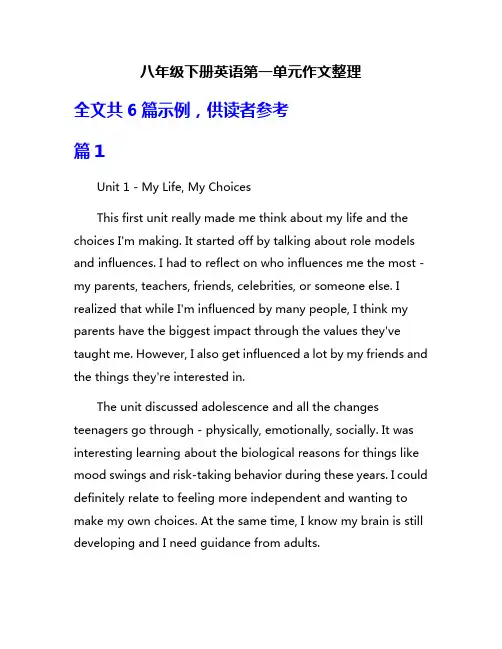
八年级下册英语第一单元作文整理全文共6篇示例,供读者参考篇1Unit 1 - My Life, My ChoicesThis first unit really made me think about my life and the choices I'm making. It started off by talking about role models and influences. I had to reflect on who influences me the most - my parents, teachers, friends, celebrities, or someone else. I realized that while I'm influenced by many people, I think my parents have the biggest impact through the values they've taught me. However, I also get influenced a lot by my friends and the things they're interested in.The unit discussed adolescence and all the changes teenagers go through - physically, emotionally, socially. It was interesting learning about the biological reasons for things like mood swings and risk-taking behavior during these years. I could definitely relate to feeling more independent and wanting to make my own choices. At the same time, I know my brain is still developing and I need guidance from adults.One of the main themes was decision-making and its consequences. There were some pretty thought-provoking stories about teenagers who made poor choices and had to face tough situations as a result. It made me consider how my choices today could impact my future. TheUnit stressed using good judgement and thinking through long-term effects instead of just going with what feels good in the moment.We learned some strategies for making wise decisions, like weighing pros and cons, identifying potential obstacles, and considering moral principles. I think the most useful was learning to stop and put space between an impulse and an action so I can think it through clearly. It's so easy to just go with your first instinct, which isn't always the best choice. Pausing to reflect could really help me avoid regrets.The stories and role plays showed how peer pressure can sway your decisions in negative ways if you aren't careful. We talked about techniques for responding to peer pressure, like using humor to divert it or simply saying "No thanks, I don't want to." It also emphasized finding friends who will respect you for being true to yourself rather than giving in.We did an activity ranking different influences and I realized how much of an impact things like music, movies, and socialmedia can have on my choices and behaviors. It made me more aware of the messages I'm absorbing from media and their effect, whether intended or not. I need to be a critical consumer.The unit made me think hard about my values, principles, and goals for the future. What kind of person do I want to be? What's really important to me? We had to write our own personal mission statements summarizing our core values and priorities at this stage of life. Mine included things like working hard to achieve my dreams, staying true to myself, treating others with kindness and respect, and making choices that will lead to a healthy mind and body. Living according to my values rather than momentary feelings will put me on the right path.Overall, this unit really drove home that my habits and choices matter immensely during these formative teenage years. The decisions I make now can open doors in the future or severely limit my options if I'm not careful. Things like doing drugs, getting in trouble with the law, staying up late every night, or slacking off in school seem harmless in the moment but could derail my life goals. It's up to me to pause and make wise choices aligned with my values and dreams. I'm glad we took the time to dig into this - it will really help me navigate my way through these crazy teenage years with more intention.篇2Unit 1 - Caring for the EnvironmentThis unit really opened my eyes to the environmental challenges facing our planet. I learned so much about issues like pollution, energy consumption, and loss of biodiversity.One of the main topics was air pollution. I was shocked to learn how many emissions come from things like factories, power plants and vehicles. These release pollutants like carbon monoxide, sulfur dioxide and particulate matter into the atmosphere. This hazy smog is not only unsightly, but extremely hazardous to human health. Long-term exposure increases risks of respiratory illnesses like asthma and lung cancer. It's scary to think we could be slowly damaging our lungs every time we go outside in a polluted city.But air pollution doesn't just impact people – it's also extremely destructive to the environment. Gases like carbon dioxide contribute to the greenhouse effect, causing global warming. This temperature rise is melting glaciers, raising sea levels, and disturbing ecosystems all over the world. Some predictions even suggest certain low-lying island nations could disappear entirely if sea levels continue rising unabated. Theconsequences could be catastrophic for both human populations and animal habitats.Water pollution was another big focus area. I was honestly quite disgusted to learn about how much sewage, chemicals and trash ends up contaminating our rivers, lakes and oceans. This wastewater comes from many sources - untreated factory runoff, oil spills, storm drains carrying litter, and overuse of fertilizers and pesticides by agriculture. Not only does it look appalling, it also destroys aquatic life and makes water unsafe for drinking, swimming and fishing. No wonder so many people lack clean water access worldwide.Tied into this was the issue of plastic pollution, which I found quite depressing. Every year, millions of tons of plastic waste end up in waterways, eventually washing out into the ocean. This plastic breaks down into microplastics that marine life mistakes for food. Images of turtles trapped in plastic rings or whales washed up with stomachs full of plastic bags were truly sobering. It seems our oceans are basically becoming a plastic soup unless we change disposal habits quickly篇3Unit 1: A Brighter FutureThe first unit of our 8th grade English textbook for the second semester was all about looking ahead to the future and setting goals for ourselves. As a student, this topic really resonated with me because I'm at a stage in life where I'm starting to think more seriously about what I want to do with my life and what kind of future I envision for myself.The unit kicked off with a reading passage about a young girl named Emily who had big dreams of becoming a successful businesswoman. I found her story really inspiring because despite facing many challenges and setbacks, she never gave up on her goals. She worked hard, stayed focused, and ultimately achieved her dreams. It made me realize that no matter how difficult or far-fetched our goals may seem, with perseverance and determination, we can make them a reality.One of the vocabulary sections in this unit focused on words and phrases related to goal-setting and personal development. We learned words like "aspiration," "ambition," "perseverance," and "resilience." These words really resonated with me because they encapsulate the mindset and qualities that are necessary for achieving our goals. It's not enough to just have a dream; we need to have the drive, determination, and grit to see it through, even when faced with obstacles and setbacks.The unit also covered a lot of grammar points related to the future tense, such as "will," "going to," and present continuous for future plans. Learning these grammar points was really useful because they allowed us to talk about our future plans and aspirations in a more nuanced and precise way. For example, instead of just saying "I want to be a doctor," we could say "I'm going to study medicine at university" or "I will work hard to become a doctor."One of my favorite parts of the unit was the writing section, where we had to write an essay about our future goals and aspirations. It was a great opportunity for me to really reflect on what I want to achieve in life and how I plan to get there. I wrote about my dream of becoming an engineer and working on cutting-edge technology that could make a positive impact on the world. Writing that essay not only helped me practice my writing skills, but it also solidified my goals and gave me a clearer sense of purpose.Overall, I really enjoyed learning about setting goals and planning for the future in this unit. It made me realize that while the future may seem uncertain and daunting, it's also full of possibilities and opportunities. By setting clear goals, staying focused, and persevering through challenges, we can shape ourown destinies and create the kind of future we want for ourselves.篇4Unit 1 - A Changing WorldThe first unit of this semester's English textbook explores the topic of change, which I found quite interesting and relevant to my life. Change is all around us, whether it's changes in technology, changes in our communities and the world, or simply changes we experience as we grow older.One of the themes was adapting to changes in technology. The readings and dialogues discussed things like new gadgets and software always emerging. I can definitely relate to that! It seems like every time I get used to one tech product, something new and "better" comes along. My parents sometimes struggle to keep up with rapidly evolving phones, computers, apps etc. But for people my age, we tend to adapt quicker since we've grown up with this constant stream of new tech.The unit also looked at changes happening in society, the environment, and the job market. There were some pieces about climate change impacting the planet in unpredictable ways. Other texts discussed economies shifting and jobs becomingobsolete due to new technologies like AI and automation. It was quite eye-opening to learn about all the dramatic changes potentially coming in the near future.On a more personal level, the unit examined the types of changes we face as individuals over our lifetimes. There were stories about kids dealing with things like moving homes, changing schools, friends growing apart, and of course all the changes that come with getting older and becoming an adult. I could empathize with a lot of those tales about friendship,self-discovery and coming-of-age experiences.Overall, this unit got me thinking more about the inevitability of change in life. Some changes are exciting, like fun new technologies. Others can be difficult, like having to adapt to new situations or coping with loss. But one thing is certain - change will keep happening, whether we like it or not! The key is learning to embrace change with a positive mindset.The unit luckily provided plenty of vocabulary and useful language for discussing changes, which will be helpful for writing and conversing on this subject. Some phrases I found practical were:"The landscape of ____ is shifting rapidly...""Developments/advancements in ____ are transforming the way we...""The traditional _____ industry is being disrupted by...""This new _____ represents a paradigm shift in how we...""As I enter a new stage/phase of life...""Change can be unsettling, but also invigorating..."Having these kinds of expressions in my English toolbox will allow me to articulate my thoughts and experiences around change much more fluidly.In terms of skills practice, we did several exercises on using the future tenses properly, which is crucial for speculating about changes ahead. We also worked on comparing/contrasting this and using transitional phrases when describing differences between the past/present/future. Tons of useful stuff for a topic all about transformation over time.The project at the end was really cool too - we had to research a developing technology and give a short presentation about how it could change people's lives down the road. I chose to present on self-driving cars, which I think will dramatically impact transportation, urban planning, safety and more in thecoming decades. It was fun extrapolating all the potential implications, both positive and negative.So in the end, while all the talk of upheaval and acceleration of change was a bit dizzying, this unit really drilled home the importance of being adaptive and open-minded about the future. The world keeps evolving, and our ability to evolve with it will be crucial for success. I'm feeling better prepared to face an uncertain, but no doubt very different, world after working through all this engaging content.篇5Learning a New Language - Not as Hard as It Seems!Hi there! For this essay, I've been asked to summarize the first unit we covered in our 8th grade English textbook this semester. To be honest, when I first opened the book to that unit and saw the title "Expressing Yourself", I wasn't exactly thrilled. I thought it would just be more boring grammar rules and vocabulary lists. Boy, was I wrong!This unit has actually been really interesting and useful. The big idea is all about how learning a new language gives you a powerful tool to express yourself in new ways and connect with people across cultures. And it's shown me that English can be funif you approach it the right way. Let me break down what we've covered:We started off looking at how languages borrow words from each other over time. Our teacher showed us examples like how English took "kiosk" from Turkish, "sofa" from Arabic, and "sawasdeekah" as a greeting from Thai. She explained how languages are always evolving by integrating new words from across the globe.I thought that was a pretty cool concept - it means English has roots all over the world. And it motivated me to pay closer attention to words I use every day to see if I could figure out their origins. Like did you know "algebra" came from Arabic? Mind blown!From there, we did a fun activity where we had to create made-up words and definitions to describe different personality traits and habits. My word was "shlifftastic" for someone who is always interrupting and talking over others. Hilarious, right? Expressing yourself through making up new words really reinforced how language is this living, breathing tool that you can get creative with.The unit then went into more depth on how language influences culture and vice versa. We looked at examples ofidioms and expressions that don't really make literal sense unless you understand the cultural context. Like how in English we say "it's raining cats and dogs" but in Russian they say "bears are tying knots in the clouds." Weird, but kind of poetic if you think about it!We also learned about differences in cultural attitudes around things like personal space, eye contact, hand gestures and more. Our teacher had us analyze scenes from movies set in different countries to identify cultural norms at play. It waseye-opening to see how simple nonverbal cues can mean totally different things in different parts of the world.My biggest takeaway was that cross-cultural communication is tricky! If you want to effectively connect with people from other backgrounds, you need to have cultural awareness and not just book knowledge of vocabulary and grammar rules.One of the coolest parts of the unit was getting to hear from guest speakers who immigrated to our country and had to learn a new language as teens or adults. They shared super inspiring stories about the challenges and payoffs of mastering a new language later in life.I'll never forget when one speaker, a woman from Venezuela, talked about how lonely and isolated she felt those first fewyears after arriving. She didn't know much English and was too self-conscious to really put herself out there. But then she started taking classes, joined a conversation club, and just kept studying and practicing relentlessly. Years later, she told us, "Learning this language gave me a voice again. I could finally express who I truly am."Hearing that perspective drove home why learning languages is about so much more than just vocabulary drills. It's a way to share your inner self, connect with others, and integrate into new communities and cultures. I have so much respect now for anyone who has mastered multiple languages.To wrap up the unit, we had to do a final project showcasing what we learned. My friend and I decided to make a skit video showing examples of cultural misunderstandings due to language barriers. We had people mix up hand gestures, not understand personal space norms, butcher common idioms - that kind of thing. We performed it for the class and I think we did a pretty good job making it funny while also educational.Overall, while I was a bit apprehensive at first, this unit on language and self-expression has been one of my favorites so far this year. It's opened my eyes to the rich diversity in communication styles across cultures. And it's motivated me tokeep working hard on English, while also being curious to pick up other languages in the future.Being multilingual gives you multiple lenses to see and experience the world. And in today's globally connected world, what could be more valuable than that? I may only be in 8th grade, but this unit has me feeling very shlifftastic about my English skills already. Here's to many more units of cultural exploration and self-expression ahead!篇6Unit 1 - Teenage LifeTeenage years can be some of the most exciting, yet challenging times of our lives. As middle schoolers, we're navigating the tricky transition between childhood and adulthood. Our bodies are changing, our minds are developing, and we're starting to discover who we really are as individuals. This unit on "Teenage Life" couldn't have come at a better time!The first text we read was an interesting article about the brain development of teenagers. I found it quite eye-opening to learn that the prefrontal cortex, the part of the brain involved in decision-making and problem-solving, isn't fully developed until our early 20s. No wonder we teenagers can be impulsive andmake rash decisions sometimes! The article helped me realize that it's normal for our thoughts and behaviors to be inconsistent during these years. We're just works in progress.What I enjoyed most, however, were the two short stories we analyzed - "The Scarlet Ibis" and "The Jade Peony." Both tales provided thought-provoking perspectives on family relationships and growing up. In "The Scarlet Ibis," I was deeply moved by the narrator's love and guilt towards his disabled brother. The story taught me about the importance of empathy, acceptance, and not judging others based on their differences. Meanwhile, "The Jade Peony" gave me a glimpse into the fascinating Chinese-Canadian culture and the challenges of preserving one's heritage. The complex sibling dynamics reminded me of my own relationships with my brothers and sisters.Grammar-wise, we focused on using conditionals to express real and unreal situations. Being able to construct "if...then" statements is crucial for logical reasoning and exploring hypothetical scenarios. These skills will definitely come in handy when we have to make important life decisions as we transition into adulthood.My personal favorite were the writing exercises, where we had the chance to express our thoughts and experiences through different genres. We wrote descriptive paragraphs about our childhood memories, opinion essays on controversial teen issues, and creative short stories with adolescent protagonists. I felt that writing allowed me to make sense of my emotions and explore my identity in a safe, judgement-free space.Throughout this unit, I've gained a deeper appreciation for the universal challenges and triumphs of the teenage experience. From mood swings to social pressures, from sibling quarrels to self-discovery, we're all in this rollercoaster ride together. And you know what? That thought is comforting in its own way. We may feel isolated in our struggles, but the literature and discussions have shown that we're never truly alone.By delving into the minds of authors and characters, I've learned to be more understanding, not just of my peers, but of my own thoughts and behaviors. I'm starting to cut myself some slack, to accept that it's okay to not have it all figured out yet. After all, aren't our teenage years supposed to be about constant growth, experimentation, and finding our place in this great big world?。
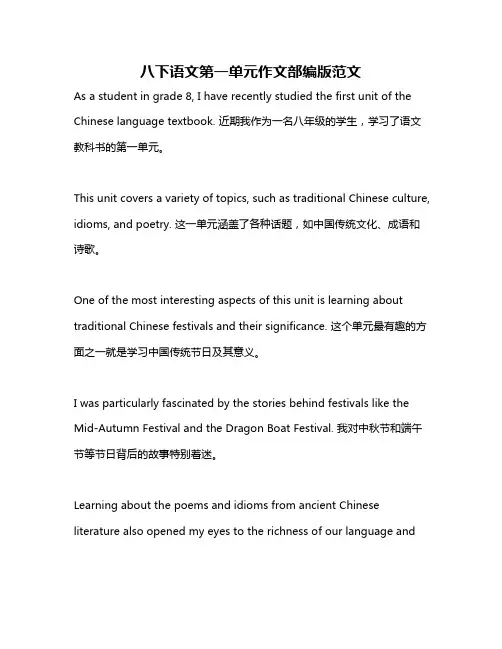
八下语文第一单元作文部编版范文As a student in grade 8, I have recently studied the first unit of the Chinese language textbook. 近期我作为一名八年级的学生,学习了语文教科书的第一单元。
This unit covers a variety of topics, such as traditional Chinese culture, idioms, and poetry. 这一单元涵盖了各种话题,如中国传统文化、成语和诗歌。
One of the most interesting aspects of this unit is learning about traditional Chinese festivals and their significance. 这个单元最有趣的方面之一就是学习中国传统节日及其意义。
I was particularly fascinated by the stories behind festivals like the Mid-Autumn Festival and the Dragon Boat Festival. 我对中秋节和端午节等节日背后的故事特别着迷。
Learning about the poems and idioms from ancient Chinese literature also opened my eyes to the richness of our language andculture. 学习古代中国文学中的诗歌和成语也让我对我们的语言和文化的丰富性有了更深的了解。
It made me appreciate the beauty and wisdom that have been passed down through generations. 这使我欣赏到了代代相传的美丽和智慧。
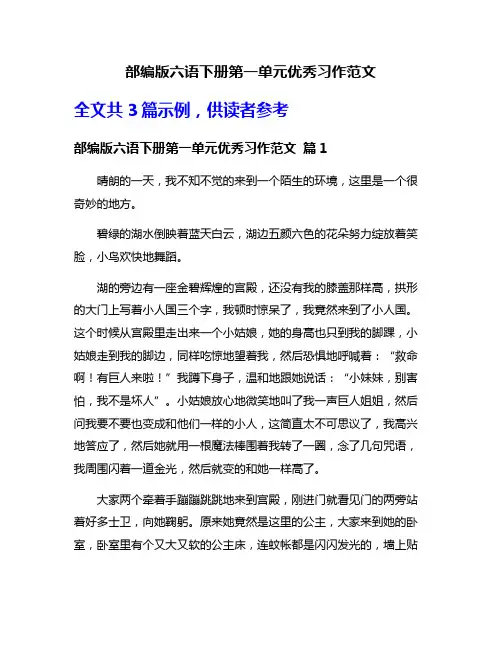
部编版六语下册第一单元优秀习作范文全文共3篇示例,供读者参考部编版六语下册第一单元优秀习作范文篇1晴朗的一天,我不知不觉的来到一个陌生的环境,这里是一个很奇妙的地方。
碧绿的湖水倒映着蓝天白云,湖边五颜六色的花朵努力绽放着笑脸,小鸟欢快地舞蹈。
湖的旁边有一座金碧辉煌的宫殿,还没有我的膝盖那样高,拱形的大门上写着小人国三个字,我顿时惊呆了,我竟然来到了小人国。
这个时候从宫殿里走出来一个小姑娘,她的身高也只到我的脚踝,小姑娘走到我的脚边,同样吃惊地望着我,然后恐惧地呼喊着:“救命啊!有巨人来啦!”我蹲下身子,温和地跟她说话:“小妹妹,别害怕,我不是坏人”。
小姑娘放心地微笑地叫了我一声巨人姐姐,然后问我要不要也变成和他们一样的小人,这简直太不可思议了,我高兴地答应了,然后她就用一根魔法棒围着我转了一圈,念了几句咒语,我周围闪着一道金光,然后就变的和她一样高了。
大家两个牵着手蹦蹦跳跳地来到宫殿,刚进门就看见门的两旁站着好多士卫,向她鞠躬。
原来她竟然是这里的公主,大家来到她的卧室,卧室里有个又大又软的公主床,连蚊帐都是闪闪发光的,墙上贴满了花朵,还有梳妆台,和各种款式的公主礼裙。
哇,真是让我大开眼界了呢,平常母亲给我买的公主裙太少了,真让我羡慕啊!公主还带我参观了国王和王后居住的地方,就像动画片里看过的一样太豪华了。
他们还给我做了美味大餐,一个超大的桌子摆满了好多美味的,有龙虾、螃蟹、奥尔良鸡翅、甜品……还有母亲不让喝的可乐、饮料,这下可没人管我了,可以大吃一顿了。
正在我筹备用餐的时候,“叮铃铃,叮铃铃”……是我的小闹钟响了,接着又听到母亲让我起床的声音,啊!这原来是一场梦呀!真不舍得醒来,我真的想去真正的小人国游玩呢!部编版六语下册第一单元优秀习作范文篇2自然界里充满奇幻和美丽,吸引着无数人去探索它。
我也不例外,所以在一个阳光明媚的日子里,我出发了。
我心里除去激动还是激动,但脚步却是颤抖的,心里当然也害怕!我来到了一个仿佛与世隔绝的深山老林,开始了我的首次探险之旅。
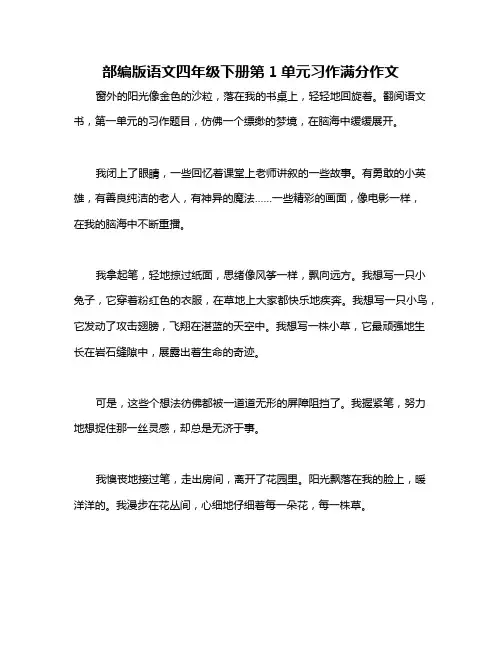
部编版语文四年级下册第1单元习作满分作文
窗外的阳光像金色的沙粒,落在我的书桌上,轻轻地回旋着。
翻阅语文书,第一单元的习作题目,仿佛一个缥缈的梦境,在脑海中缓缓展开。
我闭上了眼睛,一些回忆着课堂上老师讲叙的一些故事。
有勇敢的小英雄,有善良纯洁的老人,有神异的魔法……一些精彩的画面,像电影一样,
在我的脑海中不断重播。
我拿起笔,轻地掠过纸面,思绪像风筝一样,飘向远方。
我想写一只小兔子,它穿着粉红色的衣服,在草地上大家都快乐地疾奔。
我想写一只小鸟,它发动了攻击翅膀,飞翔在湛蓝的天空中。
我想写一株小草,它最顽强地生长在岩石缝隙中,展露出着生命的奇迹。
可是,这些个想法彷佛都被一道道无形的屏障阻挡了。
我握紧笔,努力地想捉住那一丝灵感,却总是无济于事。
我懊丧地接过笔,走出房间,离开了花园里。
阳光飘落在我的脸上,暖洋洋的。
我漫步在花丛间,心细地仔细着每一朵花,每一株草。
忽然,我发现自己了一只小蜜蜂,它一直在花丛中辛勤耕耘地采集花粉。
它忙碌的身影,好似在说说我,生命的意义只在于不断地的努力和付出。
回到自己房间,我立即拿出纸笔,心中饱含了力量。
我正在写我的作文,字里行间透着了对生命的热爱和对生活的感悟。
我又写了小蜜蜂辛勤劳作的故事,又写了小草顽强生长的精神,便写了小鸟自由飞翔的梦想……
当成功后来一笔时,我轻吁地吸了一口气,彷佛拔下了一块低沉的石头。
看着远处我的作文,我心中饱含了喜悦和成就感。
我知道,这不但是一篇习作,更是一份珍贵的礼物,一份跪求成长和感悟的礼物。
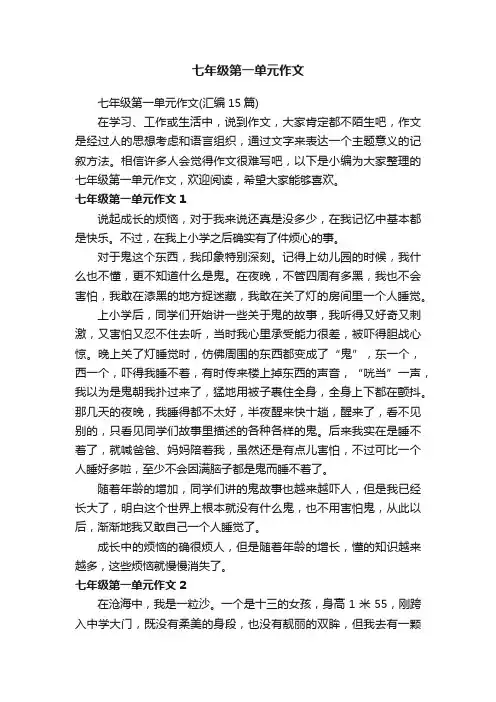
七年级第一单元作文七年级第一单元作文(汇编15篇)在学习、工作或生活中,说到作文,大家肯定都不陌生吧,作文是经过人的思想考虑和语言组织,通过文字来表达一个主题意义的记叙方法。
相信许多人会觉得作文很难写吧,以下是小编为大家整理的七年级第一单元作文,欢迎阅读,希望大家能够喜欢。
七年级第一单元作文1说起成长的烦恼,对于我来说还真是没多少,在我记忆中基本都是快乐。
不过,在我上小学之后确实有了件烦心的事。
对于鬼这个东西,我印象特别深刻。
记得上幼儿园的时候,我什么也不懂,更不知道什么是鬼。
在夜晚,不管四周有多黑,我也不会害怕,我敢在漆黑的地方捉迷藏,我敢在关了灯的房间里一个人睡觉。
上小学后,同学们开始讲一些关于鬼的故事,我听得又好奇又刺激,又害怕又忍不住去听,当时我心里承受能力很差,被吓得胆战心惊。
晚上关了灯睡觉时,仿佛周围的东西都变成了“鬼”,东一个,西一个,吓得我睡不着,有时传来楼上掉东西的声音,“咣当”一声,我以为是鬼朝我扑过来了,猛地用被子裹住全身,全身上下都在颤抖。
那几天的夜晚,我睡得都不太好,半夜醒来快十趟,醒来了,看不见别的,只看见同学们故事里描述的各种各样的鬼。
后来我实在是睡不着了,就喊爸爸、妈妈陪着我,虽然还是有点儿害怕,不过可比一个人睡好多啦,至少不会因满脑子都是鬼而睡不着了。
随着年龄的增加,同学们讲的鬼故事也越来越吓人,但是我已经长大了,明白这个世界上根本就没有什么鬼,也不用害怕鬼,从此以后,渐渐地我又敢自己一个人睡觉了。
成长中的烦恼的确很烦人,但是随着年龄的增长,懂的知识越来越多,这些烦恼就慢慢消失了。
七年级第一单元作文2在沧海中,我是一粒沙。
一个是十三的女孩,身高1米55,刚跨入中学大门,既没有柔美的身段,也没有靓丽的双眸,但我去有一颗进取的心,有着崇高的理想。
因此,看似平凡的我,变得不平凡。
我的优点就是爱动脑筋,只要遇到一个难题就会绞尽脑汁的去把他搞清楚,不搞清楚决不罢休。
我的缺点就是有时粗心,没有耐心.没有恒心。
【导语】部编版六年级下册第⼀单元的习作,是要介绍家乡的风俗。
“离家三⾥远,别是⼀乡风。
”我们的祖国幅员辽阔,民族众多,每个地⽅都有⾃⼰独特的风俗习惯。
你的家乡有哪些特别的风俗习惯?为⼤家准备了《六年级下册第⼀单元作⽂10篇》,供⼤家参考阅读。
【篇⼀】六年级下册第⼀单元作⽂ 我⽼家在⽂成,家乡的风俗及活动有很多,清明节扫墓,端午节划龙⾈、吃粽⼦,中秋节猜灯谜、赏花灯……但我印象最深刻的还是春节。
每年的春节,我与爸爸妈妈都会去乡下陪爷爷奶奶⼀起过年。
⼤年三⼗这天是⼀年中最热闹⼜丰富多彩的⼀天。
⼀⼤早邻居家就响起鞭炮声。
这时爷爷就忙上了,磨⾖⼦,做⾖腐,蒸糯⽶,捣年糕,杀鸡,杀兔。
我最喜欢的还是把粗糙的⽶粉变成⼀块⼀块的年糕。
蒸熟的⽶粉团有点烫⼿,等它冷⼀会,爷爷就开始不停的揉啊揉,⼀会⽤⼿推来推去,⼀会⼜翻个⾯。
为防⽌粘⼿,还会适当的加⼀些⾊拉油,等揉到韧性⼗⾜,再把⼤粉团分成⼩份,⼤家⼀起做成形。
爷爷喜欢长条的,他拿模板⼀压,⼀条带有吉祥如意字样的长条年糕就好了。
⽽我就与众不同,⽤年糕做了许许多多的⼈样,这是爷爷,这是表弟,这是堂哥……虽然样貌有些许丑,但爷爷还是夸我别出⼼裁,做得很好。
年糕做完了,蒸⼀蒸,炒⼀炒就开锅了,闻着⾹味,还是我熟悉的青菜酱油⾁炒年糕。
⼤年三⼗不仅有趣,就连吃饭也有讲究。
必须⼀家⽼⼩都坐下,举杯互相祝福,在桌上不能谈伤⼼事,说坏话。
狼吞虎咽席卷⼀阵后,⼀定得⼤家吃饱喝⾜,才分压岁钱,下桌放鞭炮玩去。
接下来就是看春晚,⼀直到⼗⼆点,村⾥依旧灯⽕通明,依旧响着此起彼伏的鞭炮声。
别有⼀番风味,也是我们⼩孩欢呼雀跃的时候。
新的⼀年新的开始,过了年,就意味着⼤了⼀岁,该更懂事了。
除⼣过后是正⽉,接下来是元宵,也就意味着要开学了,不知不觉中也有⼀丝不舍,再次期待春节的到来。
【篇⼆】六年级下册第⼀单元作⽂ 在春节,我的家乡有许多风俗,如:贴春联、舞狮、包饺⼦……其中,我最喜欢的就是包饺⼦。
部编版八年级下册语文第一单元作文范文As a student in the eighth grade, I find writing essays to be both challenging and rewarding. 作为一名八年级的学生,我发现写作文既具有挑战性又具有回报性。
Writing essays allows me to express my thoughts and opinions on various topics. I can share my ideas and connect with readers through my words. 写作文使我能够表达对各种主题的想法和观点。
我可以通过我的文字分享我的想法,与读者建立联系。
When I start writing an essay, I usually begin with a brainstorming session to generate ideas. I jot down key points and organize my thoughts before diving into the actual writing process. 当我开始写作文时,我通常会进行头脑风暴,以产生想法。
在着手实际写作之前,我会记录关键要点,整理思绪。
Structuring an essay is crucial to ensuring clarity and coherence in my writing. I make sure to have a clear introduction, body paragraphs, and a succinct conclusion to tie everything together. 组织一篇作文对于确保我的写作清晰和连贯至关重要。
我要确保有明确的引言,主体段落和简明扼要的结论来统一一切。
七年级第一单元作文范文10篇(精选)在日常学习、工作和生活中,大家都有写作文的经历,对作文很是熟悉吧,作文是经过人的思想考虑和语言组织,通过文字来表达一个主题意义的记叙方法。
下面是为大家整理的关于七班级第一单元作文范文10篇(精选),希望对您有所帮助!七班级第一单元作文范文篇1“我是一个落魄的逃亡者,用一半的自己追赶自己的另一半。
”——题记一半我只真正生活在这一半中,快乐、自信、没有忧伤、没有烦恼。
我可以在这一半中享受音乐给我带来的青春与活力,可以在这一半中看到我喜爱的杂志;可以在这一半中背诵令我心醉的诗歌……这一半的我忙碌却很充实。
在这一半中,朋友是真诚的,父母是和蔼的,同学是可爱的,天空是蔚蓝的,河水是清澈的,鱼儿是自由自在的……然而这一半的我有一个重要的任务——追赶上我的另一半。
另一半我的另一半完全生活在老师、家长的期盼中,我的思想背完全束缚在ABC与XYZ之中。
我另一半的生活中只能听到我急促的脚步声,看到我奋笔疾书的身影,陪伴我的也只有色彩单调的一本本参考书。
另一半的我同样的忙碌,忙着完成雪片似的卷子,忙着应付接连不断的考试,忙着准备令人头痛的奥赛……在这另一半中,天空出现了乌云,河水不再清澈,鱼儿也艰难地呼吸着新鲜的空气……另一半的我疲惫却不后悔,一直在努力奔跑,朝着那清晰而又模糊的目标加速度奔跑着……追赶我的一半一直追赶着另一半,而另一半总是在一半马上要追上它时加速度。
于是,无论是我的一半还是另一半都很累,虽然累,我仍然很快乐,因为在奔向地平线的同时,我享受到了温暖阳光与凛冽寒风同时存在的感觉。
后记:我真正成为了一个落魄的逃亡者,我生活在半个自己中,用一半的自己追赶自己的另一半,痛并快乐着。
七班级第一单元作文范文篇2在成长的过程中,每个人都会遇到不烦心的事,当然,我也不列外。
春天来了,草发芽了,小树长高了,然而我的头发也长长了,那天放学回到家,妈妈就叫我去理发店把头发剪了,听到这句话,我愣了一下,因为我早就想拥有一头乌黑发亮的长发,像电视里打飘柔广告里的那位女生,可是,听到妈妈叫我去剪头发,我还真有些不舍,妈妈好像看穿了我的心思,就对我说∶“短发好,方便梳理,不久就要读书了,早上起来把头发整理整理就ok了。
部编版必修下第一单元作文
哎,阳光真的太好了,照在那青石板路上,看起来都闪闪发亮的。
街角那家茶馆,老人家们就坐在那儿,抽着旱烟,讲着以前的
事儿,那些老故事听起来都特有意思。
小孩们就在巷子里跑来跑去,笑得可欢了,真热闹啊!
晚上一到,这城市可就热闹起来了。
霓虹灯一闪一闪的,跟天
上的星星似的。
大家都出来玩了,情侣们手拉手在江边散步,吹吹风,看起来特别浪漫。
夜市那边更不得了,小吃摊上烟雾缭绕,香
味飘得老远都能闻到,让人忍不住想过去尝尝。
说起来,这城市晚上真的不一样,有静的也有闹的,每个人都
在享受自己的时光,感觉特别自在。